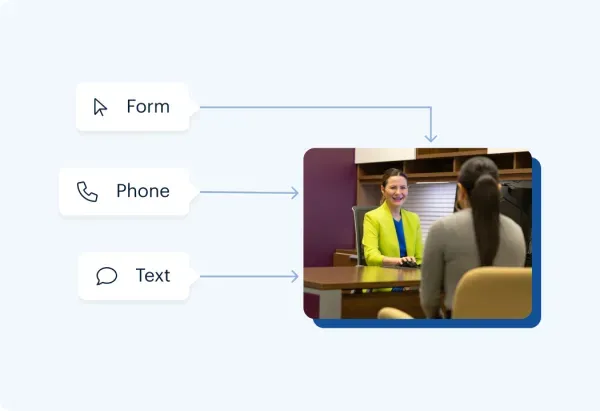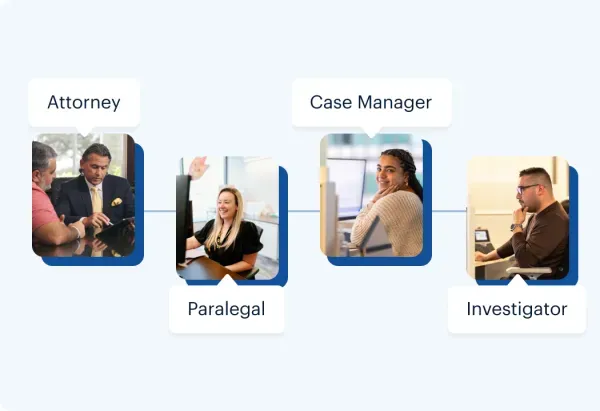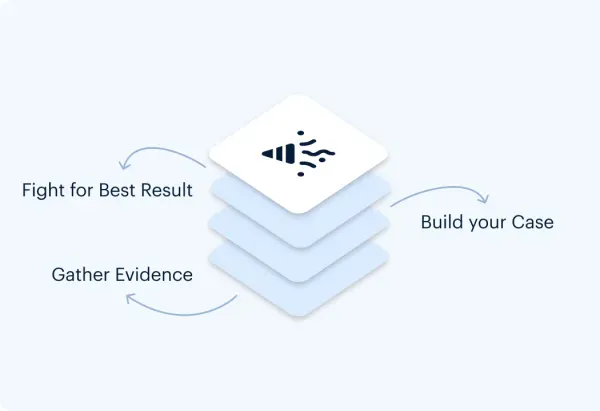Cases will be handled by attorneys licensed in the local jurisdiction. Cases may be associated with, or referred to, other law firms as co-counsel or referral counsel. Results may vary depending on your particular facts and legal circumstances. The attorney featured above is licensed in Florida. For a full list of attorneys in your state please visit our attorney page.
CHARLOTTE SOCIAL SECURITY DISABILITY ATTORNEY
Applying for Social Security Disability (SSD) benefits can be overwhelming, and many claims are denied at first. In Charlotte and across North Carolina, a denial isn’t the end. A Morgan & Morgan Social Security Disability attorney can guide you through the appeals process and fight for the benefits you’ve earned.
Cases will be handled by attorneys licensed in the local jurisdiction. Cases may be associated with, or referred to, other law firms as co-counsel or referral counsel. Results may vary depending on your particular facts and legal circumstances. The attorney featured above is licensed in Florida. For a full list of attorneys in your state please visit our attorney page.
Charlotte, NC Social Security Disability
If you’ve been denied Social Security Disability benefits, you’re not alone. The Social Security Administration (SSA) denies roughly two-in-three of all initial applications. That’s why you need experienced attorneys on your side. Morgan & Morgan’s Social Security attorneys can help you obtain the benefits to which you’re entitled. Complete a free case evaluation form to see how our Charlotte attorneys can help you.
150,000+ Five Star Reviews
The reasons why clients trust Morgan & Morgan.
Results may vary depending on your particular facts and legal circumstances. Based on select nationwide reviews.
How It Works
Unsure what to do next? With 35 years of experience, our personal
injury lawyers will guide you every step of the way.

Contact Us 24/7 - It’s Free
Start your claim

Meet your dedicated attorney
Meet the attorneys

We fight for more
Learn more about the case process
Results may vary depending on your particular facts and legal circumstances. The attorneys shown in these photos may not be licensed in your state. To find an attorney licensed in your area, please visit our attorney page.
Local Care
Backed by America’s Largest Injury Law Firm.
$30 Billion
Recovered for clients
nationwide700,000+
Clients and families
served1,000+
Attorneys across
the country1
Click may change your life
The attorney featured above is licensed in Florida. For a full list of attorneys in your state please visit our attorney page.
Results may vary depending on your particular facts and legal circumstances.
Learn More
Injured and not sure what to do next?
We'll guide you through everything you need to know.
Who qualifies for Social Security Disability?
To qualify for SSD benefits, you must meet two key criteria. First, you need to have a medical condition that meets the Social Security Administration’s (SSA) definition of “disability.” This means that your condition must prevent you from performing the work you did before and from adjusting to any other kind of work for at least a year or longer. The SSA maintains a list of qualifying impairments, but even if your exact diagnosis isn’t listed, you may still be eligible if the condition significantly limits your ability to function.
Second, you must have earned enough “Social Security credits” through your work history. These credits are based on your income and the number of years you’ve paid into the Social Security system. The required number depends on your age at the time of disability.
SSDI vs. SSI: what’s the difference?
While SSDI is based on your work history and Social Security credits, Supplemental Security Income (SSI) is a need-based program for individuals with limited income and resources. You don’t need a work history to qualify for SSI, but you do need to meet the same medical disability criteria as SSDI.
Why do SSD claims get denied?
Unfortunately, even when you meet all the requirements, the SSA may still deny your claim. There are many reasons a disability claim might be denied. In some cases, the medical records don’t fully show how serious your condition is. In others, the issue might be with the paperwork, such as missing information or a technical problem with your work history, or even a simple error, like an overlooked deadline or an incorrectly completed form.
Whatever the reason, a denial can feel like a setback, but it’s often just the beginning of the process.
How long does a typical SSDI claim take?
The average timeline from initial application to approval can range from three to six months. If you need to appeal, the process may take over a year, depending on the hearing backlog in North Carolina. The earlier you file and the more complete your documentation is, the smoother the process will be.
What should I do if my claim is denied?
If you’ve received a denial letter, you typically have just 60 days to act. That window is critical. The first step in the appeals process is called a Reconsideration, where someone at the SSA who wasn’t involved in the original decision reviews your application again. If your claim is denied again, you can request a hearing before an Administrative Law Judge (ALJ). These hearings may be conducted in person or via video.
If the ALJ also denies your claim, you can ask for a review by the Appeals Council, but they aren’t required to take your case. If they decline, or if their decision still isn’t in your favor, the final option is filing a lawsuit in Federal Court.
Each stage is more complex than the previous one, which is why many applicants seek the support of an attorney. From collecting the right medical evidence to meeting tight deadlines and preparing for hearings, legal guidance can make a significant difference in the outcome of your case.
When is reapplying the better option?
Sometimes, rather than filing an appeal, it makes more sense to start fresh with a new application, especially if your original one had serious gaps or errors. In some cases, a reapplication allows you to correct those mistakes while still preserving your original filing date, which can be critical for retroactive benefits. A knowledgeable attorney can help you make the right call.
If you’ve been denied multiple times, it’s still not the end of the road. With stronger documentation or new medical evidence, even previously rejected claims can be successful, especially when an attorney guides the process.
Working part-time while applying for disability benefits is possible in certain situations, but strict income limits apply. The Social Security Administration closely monitors how much you earn, and exceeding the allowed threshold, even with part-time work, can jeopardize your application or lead to a denial. Keeping careful track of your hours and wages is essential to avoid unintended disqualification.
What can a Charlotte disability attorney do for me?
An experienced Social Security Disability attorney will help you understand your eligibility, identify weaknesses in your claim, and develop a plan to strengthen it, whether that means gathering better medical evidence, consulting your doctors, or representing you in a hearing. Although only one of our attorneys lives in Charlotte, others licensed to practice in North Carolina are available to support your case. Wherever they’re based, they’re committed to helping North Carolinians stand up to bureaucratic roadblocks and fight for what they’ve earned.
If you’ve already been denied, your attorney can also determine whether an appeal or reapplication gives you the best shot at approval. And throughout the process, they’ll make sure you’re meeting deadlines, filing the right forms, and presenting the strongest possible case to the SSA.
How much does it cost to hire an attorney in Charlotte?
Hiring an SSD attorney shouldn’t add to your financial stress. That’s why Morgan & Morgan takes cases on a contingency fee basis; you don’t pay anything up front, and we only get paid if we win your case. There’s no risk of reaching out and starting a conversation. If you’re approved, your attorney’s fee will simply come out of your award, according to SSA guidelines.
How do I make sure I get the help I deserve after an injury?
You’ve worked hard and paid into the system. When a medical condition takes away your ability to earn a living, Social Security Disability benefits are meant to be there for you. If you’ve been denied, don’t assume it’s over. Let Morgan & Morgan review your case and help you take the next step toward getting the support you need.
Contact us today to schedule your free case evaluation. There’s no cost to talk, and no fee unless we win.








